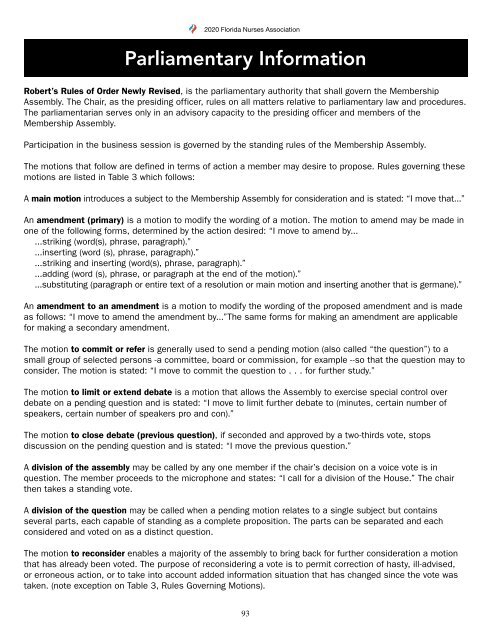2020 FNA Book Of Reports
Create successful ePaper yourself
Turn your PDF publications into a flip-book with our unique Google optimized e-Paper software.
<strong>2020</strong> Florida Nurses Association<br />
Parliamentary Information<br />
Robert’s Rules of Order Newly Revised, is the parliamentary authority that shall govern the Membership<br />
Assembly. The Chair, as the presiding officer, rules on all matters relative to parliamentary law and procedures.<br />
The parliamentarian serves only in an advisory capacity to the presiding officer and members of the<br />
Membership Assembly.<br />
Participation in the business session is governed by the standing rules of the Membership Assembly.<br />
The motions that follow are defined in terms of action a member may desire to propose. Rules governing these<br />
motions are listed in Table 3 which follows:<br />
A main motion introduces a subject to the Membership Assembly for consideration and is stated: “I move that...”<br />
An amendment (primary) is a motion to modify the wording of a motion. The motion to amend may be made in<br />
one of the following forms, determined by the action desired: “I move to amend by...<br />
...striking (word(s), phrase, paragraph).”<br />
...inserting (word (s), phrase, paragraph).”<br />
...striking and inserting (word(s), phrase, paragraph).”<br />
...adding (word (s), phrase, or paragraph at the end of the motion).”<br />
...substituting (paragraph or entire text of a resolution or main motion and inserting another that is germane).”<br />
An amendment to an amendment is a motion to modify the wording of the proposed amendment and is made<br />
as follows: “I move to amend the amendment by...”The same forms for making an amendment are applicable<br />
for making a secondary amendment.<br />
The motion to commit or refer is generally used to send a pending motion (also called “the question”) to a<br />
small group of selected persons -a committee, board or commission, for example --so that the question may to<br />
consider. The motion is stated: “I move to commit the question to . . . for further study.”<br />
The motion to limit or extend debate is a motion that allows the Assembly to exercise special control over<br />
debate on a pending question and is stated: “I move to limit further debate to (minutes, certain number of<br />
speakers, certain number of speakers pro and con).”<br />
The motion to close debate (previous question), if seconded and approved by a two-thirds vote, stops<br />
discussion on the pending question and is stated: “I move the previous question.”<br />
A division of the assembly may be called by any one member if the chair’s decision on a voice vote is in<br />
question. The member proceeds to the microphone and states: “I call for a division of the House.” The chair<br />
then takes a standing vote.<br />
A division of the question may be called when a pending motion relates to a single subject but contains<br />
several parts, each capable of standing as a complete proposition. The parts can be separated and each<br />
considered and voted on as a distinct question.<br />
The motion to reconsider enables a majority of the assembly to bring back for further consideration a motion<br />
that has already been voted. The purpose of reconsidering a vote is to permit correction of hasty, ill-advised,<br />
or erroneous action, or to take into account added information situation that has changed since the vote was<br />
taken. (note exception on Table 3, Rules Governing Motions).<br />
93

















